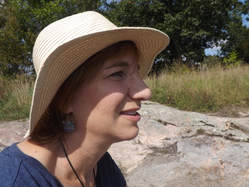Interview with Writer Meg Freer

How does the act of writing nonfiction shape you as an author?
Although I write more poetry than nonfiction, I do read a lot of nonfiction, and many of my poems are inspired by actual events or people. I often try those poems out as narrative prose first to establish the flow, and sometimes they remain as prose. Some short pieces of memoir that start as prose end up as poems that touch on just one aspect of the story. Writing small scenes of memoir, particularly, helps me process distant memories that often find their way into my poems.
What is the importance of exploring nonfiction in addition to other creative forms such as poetry and fiction?
Nonfiction writing can be a useful exercise in blending genres: it requires discipline to research and stick to the facts and a different kind of creativity to present those facts as a story with a narrative line. The best nonfiction I have read also uses poetic elements that draw me into the story. And as Mark Twain wrote, truth is stranger than fiction, so sometimes real life can provide more interesting subject matter than anything you could come up with on your own.
Please share a work of nonfiction that you find powerful. Why?
There are many works of memoir that I have found moving, but when I was a teenager I was overcome by the power of the huge book Working, written in 1974 by Chicago author and historian Studs Terkel, in which he recorded interviews with working class people about what they did all day long and how they felt about their jobs. Working taught me the value of seeing the extraordinary in the ordinary and also how fascinating and important oral history is to our understanding of human relationships and society in general.
*Meg Freer grew up in Missoula, Montana and now lives in Kingston, Ontario. She has worked as an editor and currently teaches piano and music history. She enjoys being outdoors year-round, playing the piano and running. Her award-winning poems and photos have been published in various journals and anthologies.